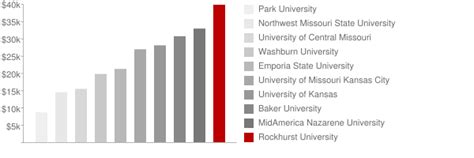As a prospective or current student, understanding the tuition and financial aid options at Rockhurst University is crucial for planning your higher education journey. This extensive guide will provide you with comprehensive information on the cost of attendance, financial assistance programs, and strategies to make your Rockhurst education affordable.

Tuition Rates for 2023-2024 Academic Year
Undergraduate Tuition
- Full-time (12-18 credit hours): $37,620 per year
- Part-time (less than 12 credit hours): $1,880 per credit hour
Graduate Tuition
- Full-time (9-12 graduate credit hours): $25,280 per year
- Part-time (less than 9 graduate credit hours): $1,264 per credit hour
Other Fees
- Student service fee: $400 per semester
- Technology fee: $100 per semester
- Campus Recreation and Wellness fee: $75 per semester
- Health Services fee: $50 per semester
Financial Aid Options
Rockhurst University offers a wide range of financial aid programs to help students cover the cost of tuition and other expenses.
Grants
- Federal Pell Grant: Up to $6,345 for eligible low-income students
- Federal Supplemental Educational Opportunity Grant: Up to $4,000 for eligible students with exceptional financial need
- Missouri State Student Financial Aid Program: Up to $3,300 for eligible undergraduate students
Scholarships
- Rockhurst University Merit Scholarships: Awarded to incoming freshmen based on academic performance and achievements
- Rockhurst University Need-Based Scholarships: Awarded to students with demonstrated financial need
- External Scholarships: Numerous scholarship opportunities available from outside organizations
Loans
- Federal Direct Subsidized Loans: No interest charged while students are enrolled at least half-time
- Federal Direct Unsubsidized Loans: Interest accrues while students are enrolled
- Federal Direct PLUS Loans: Available to parents of undergraduate students or graduate students
Tips and Tricks for Saving Money on Tuition
Apply for Financial Aid Early: Submit your FAFSA as soon as possible after October 1st of the year before you plan to enroll to maximize your chances of receiving aid.
Negotiate with the Financial Aid Office: Contact the financial aid office to discuss your financial situation and explore options for reducing your tuition.
Take Advantage of Scholarships: Research and apply for as many scholarships as possible to supplement your financial aid package.
Enroll in Part-Time Study: If you are unable to afford full-time tuition, consider enrolling part-time to reduce your costs.
Transfer Credits: Transferring credits from other institutions can shorten your time at Rockhurst and save you money on tuition.
Consider Work-Study Programs: Participate in a work-study program on or off campus to earn money while attending school.
Why Tuition at Rockhurst University Matters
While the cost of attendance may be a significant consideration, it is important to remember the exceptional value that a Rockhurst education offers:
- Small Class Sizes: Rockhurst’s average class size is 20 students, ensuring personalized attention from dedicated faculty.
- Experiential Learning: Students gain hands-on experience through internships, research projects, and service-learning opportunities.
- Career Support: Rockhurst’s Center for Career Planning and Development provides students with resume writing, interview preparation, and job search assistance.
- Nationally Recognized Reputation: Rockhurst is ranked among the top regional universities in the Midwest by U.S. News & World Report.
Conclusion
Understanding the tuition and financial aid options at Rockhurst University is essential for making informed decisions about your education. By exploring the various financial assistance programs and implementing cost-saving strategies, you can minimize the financial burden and maximize the benefits of a Rockhurst degree. Remember, the value of a Rockhurst education extends far beyond the tuition cost.
